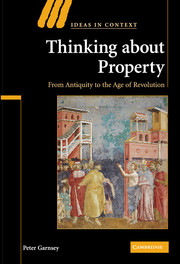Book contents
- Frontmatter
- Contents
- Abbreviations
- Preface
- Introduction
- Chapter 1 Plato's ‘communism’, Aristotle's critique and Proclus' response
- Chapter 2 Plato's ‘communism’: from late antiquity via Islamic Spain to the Renaissance
- Chapter 3 Renunciation and communality: thinking through the primitive Church
- Chapter 4 The poverty of Christ: crises of asceticism from the Pelagians to the Franciscans
- Chapter 5 The state of nature and the origin of private property: Hesiod to William of Ockham
- Chapter 6 The state of nature and the origin of private property: Grotius to Hegel
- Chapter 7 Property as a legal right
- Chapter 8 Property as a human right
- Conclusion
- Bibliography
- Index
Chapter 3 - Renunciation and communality: thinking through the primitive Church
Published online by Cambridge University Press: 22 September 2009
- Frontmatter
- Contents
- Abbreviations
- Preface
- Introduction
- Chapter 1 Plato's ‘communism’, Aristotle's critique and Proclus' response
- Chapter 2 Plato's ‘communism’: from late antiquity via Islamic Spain to the Renaissance
- Chapter 3 Renunciation and communality: thinking through the primitive Church
- Chapter 4 The poverty of Christ: crises of asceticism from the Pelagians to the Franciscans
- Chapter 5 The state of nature and the origin of private property: Hesiod to William of Ockham
- Chapter 6 The state of nature and the origin of private property: Grotius to Hegel
- Chapter 7 Property as a legal right
- Chapter 8 Property as a human right
- Conclusion
- Bibliography
- Index
Summary
PRELIMINARIES
‘In revolutionary France of April 1849, a banquet was held of “socialist priests”, 33 of them, 3 in cassocks, and the rest dressed as lay men. 600 working men joined the festivity, and toasted Jesus of Nazareth, father of socialism.’
In 1891 Pope Leo XIII issued the encyclical Rerum Novarum. The early chapters carry the message that socialism is unjust and deleterious to workers' interests, whereas private property is natural, blessed by God, and conducive to the common and private good. That principle once established, the Pope is now ready to pronounce on the issue of how the class struggle can be moderated, through a proper understanding of how wealth should be used. For guidance on this point, he says, the place to turn is not to philosophy but to the teachings of the Church; and the Pope now cites authorities. Thomas Aquinas receives pride of place, followed by New Testament texts urging charitable giving. We hear that in God's view, ‘there is nothing disgraceful in poverty, nor cause for shame in having to work for a living’: 2 Corinthians 8:9 is cited, where St Paul says of Christ: ‘He who was rich became poor for our sake.’
- Type
- Chapter
- Information
- Thinking about PropertyFrom Antiquity to the Age of Revolution, pp. 59 - 83Publisher: Cambridge University PressPrint publication year: 2007



